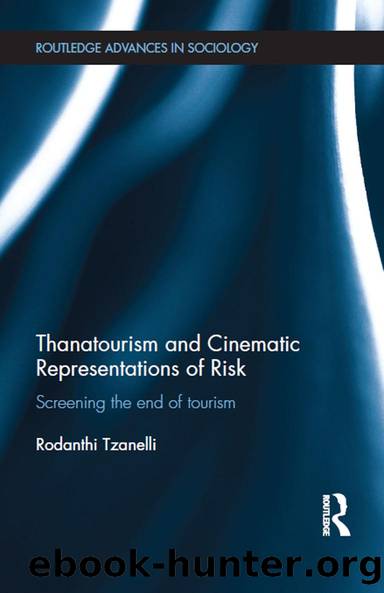Thanatourism and Cinematic Representations of Risk by Rodanthi Tzanelli

Author:Rodanthi Tzanelli [Tzanelli, Rodanthi]
Language: eng
Format: epub
Tags: Social Science, General, Sociology
ISBN: 9781317228004
Google: A0v7CwAAQBAJ
Publisher: Routledge
Published: 2016-04-14T05:08:23+00:00
Cheating death: from metaphysics to post-colonial aesthetics
African politics emanates from its metaphysics of presence â our ability to be present even in mediated forms â that can just about compare to Western phenomenologies, thanks to our widely hyperlinked and televised world. One of the immediate effects of cultural globalisation has been the translation of custom into Western idioms (Hannerz 1996; Nederveen Pieterse 2004; Appiah 2006). The consequences of such hyper-mobility have also been felt on cultural understandings of âuncivil conductâ: the flattening of notions of corruption that signals bad behaviour as much as it denotes communication with bad spirits in African metaphysical provenances. It is significant that commentators during the controversy singled out Nigeriaâs connection to the so-called â419 scamsâ (named after the relevant article in Nigeriaâs penal code) as its most enduring global stereotyping (Karimi, 22 September 2009). Otherwise known as the âNigerian scamâ or âfraudâ, these incidents betray a clear native understanding of the rules of global markets, in which âtheftâ is just a byword for entrepreneurial dexterity (Sahlins 2013: 161â2).
More importantly, these scams are conducted online, via emails that ask the recipients for money and personal bank information. The âmarksâ (targeted individuals) of what is dubbed in Western contexts âconfidence crimeâ (Nash 1976; Maurer [1940] 2000; Moore 2000) are called upon to help either for charity or because of greed. It is worth bearing in mind for the rest of the chapter that at the heart of any such âconâ is the âartâ of deception, which is why confidence criminals are also known as con artists: their skill is to be found neither in uses of force nor in violence but in the ability to misrepresent (Tzanelli et al. 2005: 98), to stage a social drama in which the principal hero is revealed to be a traitor. Equally useful nevertheless is the observation that by âAfricanisingâ rather than Westernising such âconductâ â more frequently associated with white collar crime (Shapiro 1990) and underhand dealings in the Western art of politics (Tzanelli 2011: 113) after all â we contradict our previous findings on African conceptions of time: marks are supposed to invest in futural earnings to play their part, which con artists have to comprehend in the first place, if they are to use them as an asset in their dramaturgy. Evidently, we must account for a time loop in African cosmologies to introduce confidence crime in the continentâs metaphysical provenances, which can only be related to colonialism. In conclusion then, we observe that on global interactive plateaus stereotypically African performativities tend to rely on phenomenological manipulation, whereas Western performativities are violence-based; African art is based on embodied communication, whereas Western responses rely on mental disorientation; and African theatre uses invisible tools (skills) whereas Western performance is fixated on material earnings.
The pendulum of charity and greed was crafted back in the era of Frances Drake, from whose adventurous exploits the oldest fraud was named âthe Spanish Prisonerâ. Though circulating in various forms, the con involves an affluent English
Download
This site does not store any files on its server. We only index and link to content provided by other sites. Please contact the content providers to delete copyright contents if any and email us, we'll remove relevant links or contents immediately.
| Coloring Books for Grown-Ups | Humor |
| Movies | Performing Arts |
| Pop Culture | Puzzles & Games |
| Radio | Sheet Music & Scores |
| Television | Trivia & Fun Facts |
Paper Towns by Green John(5177)
Spare by Prince Harry The Duke of Sussex(5176)
Machine Learning at Scale with H2O by Gregory Keys | David Whiting(4292)
Never by Ken Follett(3937)
Fairy Tale by Stephen King(3370)
Learning C# by Developing Games with Unity 2021 by Harrison Ferrone(3350)
Reminders of Him: A Novel by Colleen Hoover(3092)
The Man Who Died Twice by Richard Osman(3072)
Fantastic Beasts and Where to Find Them: Illustrated edition by J.K. Rowling & Newt Scamander(3021)
Will by Will Smith(2908)
0041152001443424520 .pdf by Unknown(2843)
How The Mind Works by Steven Pinker(2813)
Never Lie: An addictive psychological thriller by Freida McFadden(2581)
Fantastic Beasts and Where to Find Them: The Original Screenplay by J. K. Rowling(2510)
Rationality by Steven Pinker(2352)
It Starts With Us (It Ends with Us #2) by Colleen Hoover(2341)
The God delusion by Richard Dawkins(2305)
Borders by unknow(2303)
Friends, Lovers, and the Big Terrible Thing by Matthew Perry(2219)
